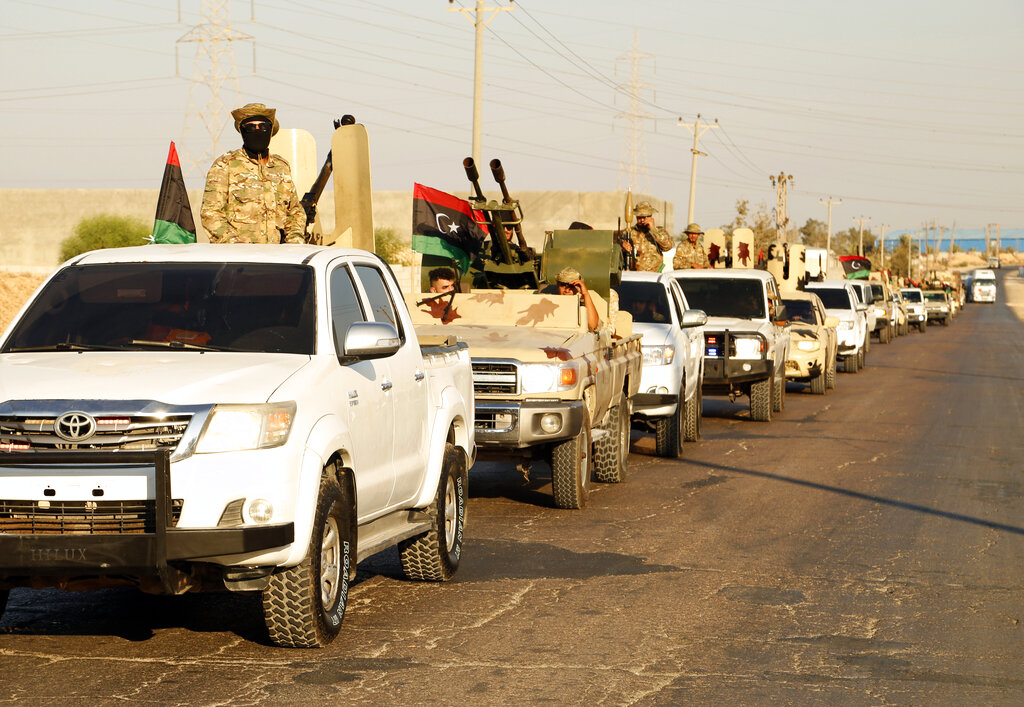ADF STAFF
Plans to hold a national election in Libya have sputtered for years.
Abdulaye Bathily, the United Nations envoy to Libya, in late November urged the country’s rival factions to select representatives for a meeting aimed at reaching an election settlement.
It was the latest plea to bring together the Libyan National Army, led by Field Marshal Khalifa Haftar, and Prime Minister Abdulhamid al-Dbeibeh’s U.N.-backed Government of National Unity, based in Tripoli.
There has been little progress in bringing the factions together since a 2020 cease-fire was reached.
As election efforts falter, some analysts are focusing on programs that would get members of armed groups to lay down their weapons and reintegrate into civilian society. It is a process known as demobilization, disarmament and reintegration (DDR), which also seeks to support former combatants, sometimes by reintegrating them into civilian life. These efforts in Libya mostly have been dormant since 2015.
“Effective DDR is a cornerstone for the advancement of peace and economic stability that is essential to the peace process,” Mona Yacoubian, vice president of the Middle East and North Africa Center at the United States Institute of Peace (USIP), said during a December discussion.
The discussion focused on an analysis by Tim Eaton, senior research fellow in the Middle East and North Africa Program at Chatham House.
Understanding local complexities is key to implementing an effective DDR process, argued Eaton, who recently produced a research paper titled, “Security actors in Misrata, Zawiya and Zintan.”
Armed groups from the three cities all fought against Moammar Gadhafi’s regime in 2011 but fought on different sides during conflicts in 2014 and the war for Tripoli that ended in 2020. Misratan and Zawaiyan forces united behind the Government of National Accord (GNA) during the Tripoli war, while Zintani forces were split between backing the GNA and Haftar’s forces.
Members of armed groups from the three cities have gained state affiliation through the defense and interior ministries and established direct relationships with the Presidency Council and Libyan Intelligence Service, Eaton reported.
It is not always clear who is part of the official security sector, Eaton found. And many armed militants seek to profit from their position.Some elements within Zawiya’s security sector can almost be considered to operate like organized crime groups, some of which are perceived as having become consolidated as mini illicit empires,” Eaton wrote.
Members of major factions in Zawiya are suspected of having ties to fuel, illegal drugs and weapons smuggling, as well as migrant smuggling and human trafficking.
Some Misratan factions are active outside the city and control access to its main entrances and port, which offers potential revenue sources. Some people told Eaton that armed groups in charge of the port benefit from their positions by facilitating the release of goods for compensation from business owners.
As in Misrata, armed groups in Zintan seek compensation from the state when they support a military campaign. Traders with longstanding relationships with armed groups have provided fuel and food to these groups for deployments.
“The relationship is seen as being so close that goods are often supplied on credit with the understanding that [an armed group] will pay for them when it receives funds from the state,” Eaton wrote.
Eaton argued that the time to begin a DDR process is now, and he highlighted some progress.
The Ministry of Labor is tasked with developing a DDR program, while the international community is exploring “pre-DDR” options. Defined by the U.N., pre-DDR is a “local-level transitional stabilization measure designed for those who are eligible for a national DDR program.”
Eaton advocated for a more diverse and forceful “next-generation DDR” approach. Next-generation DDR, a political process determined by local conditions, typically begins before peace deals are made.
However, Libya does not have a security sector reform program, limiting what can be done in terms of DDR.
“Without this, the parameters and requirements for a national DDR program remain unclear,” Eaton wrote.

